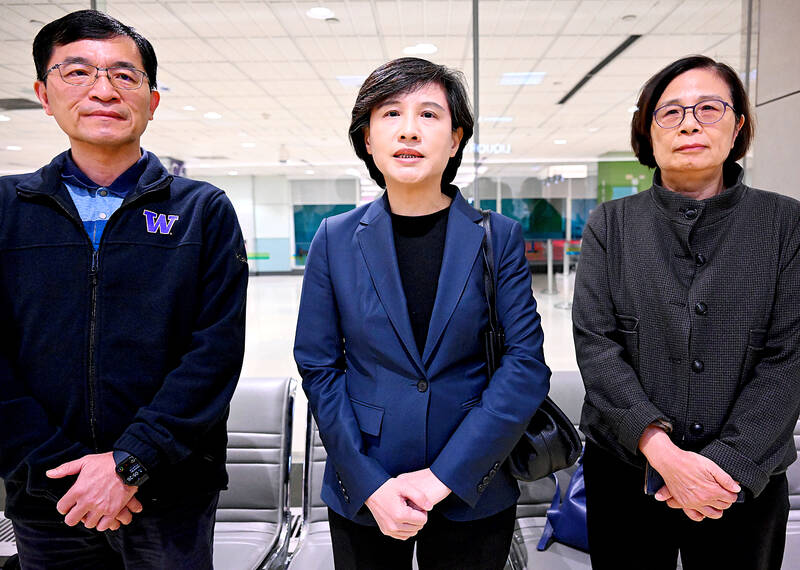Taiwan has “never made any commitment to a 50-50 split on manufacturing chips, and would not agree to such terms,” Vice Premier Cheng Li-chiun (鄭麗君) said yesterday after returning from a fifth round of in-person tariff negotiations with the US.
US President Donald Trump’s administration wants Taiwan to adopt a “50-50 split” on semiconductor manufacturing, with half of the chips used in the US to be made domestically, US Secretary of Commerce Howard Lutnick said in an interview with NewsNation on Sunday.
The concept differs from the investment direction being discussed under negotiations regarding supply chain cooperation, the Cabinet said in a statement yesterday.

Photo: Chu Pei-hsiung, Taipei Times
As the US expands its investigation into the semiconductor market under Section 232 of the US Trade Expansion Act of 1962, paving the way for potential tariffs on semiconductors, Taiwan is seeking cuts to Trump’s tariffs and preferential treatment related to Section 232, the Executive Yuan said.
The White House’s provisional 20 percent tariff on Taiwanese goods was implemented on Aug. 7, although negotiations are ongoing.
The negotiation team returned to Taiwan yesterday morning.
Cheng headed the delegation alongside Minister Without Portfolio Yang Jen-ni (楊珍妮), head of the Executive Yuan’s Office of Trade Negotiations, and Ministry of Economic Affairs personnel.
The group held in-person meetings in Washington with the Office of the US Trade Representative and the US Department of Commerce, with “some progress made,” the statement said.
Once the two sides reach a consensus on tariffs, Section 232 preferential treatment and supply chain cooperation, a meeting would be held to finalize a Taiwan-US trade agreement, the delegation said.
The US launched the ongoing Section 232 investigation in April into possible tariffs on semiconductor and other tech product imports.
The Executive Yuan said that the 50-50 condition “goes against Taiwan-US supply chain cooperation,” reiterating Taiwan’s opposition to such terms.
The idea was condemned by the Chinese Nationalist Party (KMT) and the Taiwan People’s Party (TPP).
KMT Legislator Hsu Yu-chen (許宇甄) on Monday said that the proposal was not a trade agreement, but “exploitation and plunder.”
“No one can sell out Taiwan or Taiwan Semiconductor Manufacturing Co (台積電), and no one can undermine Taiwan’s silicon shield,” KMT Chairman Eric Chu (朱立倫) said yesterday.
TPP Chairman Huang Kuo-chang (黃國昌) called the proposal an attempt to “hollow out the foundations of Taiwan’s technology sector.”

A magnitude 5.6 earthquake struck off the coast of Yilan County at 12:37pm today, with clear shaking felt across much of northern Taiwan. There were no immediate reports of damage. The epicenter of the quake was 16.9km east-southeast of Yilan County Hall offshore at a depth of 66.8km, Central Weather Administration (CWA) data showed. The maximum intensity registered at a 4 in Yilan County’s Nanao Township (南澳) on Taiwan’s seven-tier scale. Other parts of Yilan, as well as certain areas of Hualien County, Taipei, New Taipei City, Taoyuan, Hsinchu County, Taichung and Miaoli County, recorded intensities of 3. Residents of Yilan County and Taipei received

Taiwan has secured another breakthrough in fruit exports, with jujubes, dragon fruit and lychees approved for shipment to the EU, the Ministry of Agriculture said yesterday. The Animal and Plant Health Inspection Agency on Thursday received formal notification of the approval from the EU, the ministry said, adding that the decision was expected to expand Taiwanese fruit producers’ access to high-end European markets. Taiwan exported 126 tonnes of lychees last year, valued at US$1.48 million, with Japan accounting for 102 tonnes. Other export destinations included New Zealand, Hong Kong, the US and Australia, ministry data showed. Jujube exports totaled 103 tonnes, valued at

BIG SPENDERS: Foreign investors bought the most Taiwan equities since 2005, signaling confidence that an AI boom would continue to benefit chipmakers Taiwan Semiconductor Manufacturing Co’s (TSMC, 台積電) market capitalization swelled to US$2 trillion for the first time following a 4.25 percent rally in its American depositary receipts (ADR) overnight, putting the world’s biggest contract chipmaker sixth on the list of the world’s biggest companies by market capitalization, just behind Amazon.com Inc. The site CompaniesMarketcap.com ranked TSMC ahead of Saudi Aramco and Meta Platforms Inc. The Taiwanese company’s ADRs on Tuesday surged to US$385.75 on the New York Stock Exchange, as strong demand for artificial intelligence (AI) applications led to chip supply constraints and boost revenue growth to record-breaking levels. Each TSMC ADR represents

TRUST: The KMT said it respected the US’ timing and considerations, and hoped it would continue to honor its commitments to helping Taiwan bolster its defenses and deterrence US President Donald Trump is delaying a multibillion-dollar arms sale to Taiwan to ensure his visit to Beijing is successful, a New York Times report said. The weapons sales package has stalled in the US Department of State, the report said, citing US officials it did not identify. The White House has told agencies not to push forward ahead of Trump’s meeting with Chinese President Xi Jinping (習近平), it said. The two last month held a phone call to discuss trade and geopolitical flashpoints ahead of the summit. Xi raised the Taiwan issue and urged the US to handle arms sales to